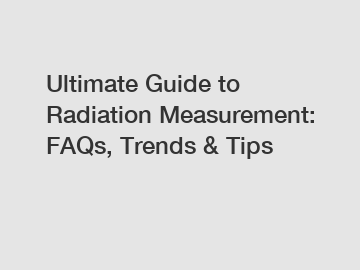Ultimate Guide to Radiation Measurement: FAQs, Trends & Tips
### Ultimate Guide to Radiation Measurement: FAQs, Trends & Tips.
#### What is radiation measurement and why is it important?
Radiation measurement refers to the process of detecting and quantifying the level of radiation in a particular environment. This is important because exposure to high levels of radiation can have harmful effects on human health, including an increased risk of cancer and other health problems. By measuring and monitoring radiation levels, we can ensure that occupational workers, patients undergoing medical treatments, and the general public are not exposed to dangerous levels of radiation.

#### What are the different methods of radiation measurement?
There are several methods used for radiation measurement, including handheld radiation detectors, dosimeters, survey meters, and spectroscopy systems. Handheld radiation detectors are portable devices that can quickly detect the presence of radiation in a specific area. Dosimeters are personal radiation monitoring devices worn by individuals to track their cumulative exposure to radiation over time. Survey meters are instruments used to measure radiation levels in a broad area, while spectroscopy systems are used for more detailed analysis of radiation sources.
#### What are the current trends in radiation measurement technology?
One of the current trends in radiation measurement technology is the development of smaller, more portable devices that offer increased sensitivity and accuracy. Additionally, advancements in spectroscopy technology have allowed for more precise identification of different types of radiation sources. There is also a growing trend towards the use of wireless communication and data logging capabilities in radiation measurement devices, allowing for real-time monitoring and analysis of radiation levels.
#### What are some tips for conducting effective radiation measurements?
When conducting radiation measurements, it is important to calibrate your equipment regularly to ensure accurate readings. Make sure to follow proper safety protocols and wear appropriate protective gear when working in areas with potential radiation exposure. Additionally, familiarize yourself with the specific characteristics of different types of radiation sources to accurately interpret measurement results. Finally, consider consulting with radiation safety experts or attending training courses to enhance your knowledge and skills in radiation measurement techniques.
In conclusion, radiation measurement is crucial for ensuring the safety of individuals exposed to radiation in various settings. By understanding the importance of radiation measurement, familiarizing yourself with different measurement methods, staying informed about current trends in technology, and following best practices for conducting measurements, you can effectively monitor and manage radiation exposure to protect human health.
Want more information on introduction to radiation detectors, I-131 radiotherapy, master oscillator power amplifier? Feel free to contact us.
196
0
0

Comments
All Comments (0)